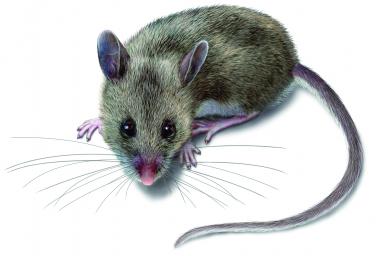Mousie
Darrell Burton was always very careful. He listened to his teacher, he studied diligently, and he did all of his homework well. Other students sometimes taunted him and said, “Don’t study so hard. You’re such a book-head.” They called him “Book-head,” but Darrell didn’t mind. He loved to learn.
This is a story about how he learned science right at home. In fact, he learned about science from experimenting with real animals. Much like scientists observe nature, Darrell did, too. He formed a hypothesis and discovered it to be true. Then he continued to study so he could learn more.
One night, Darrell woke to a strange noise coming from his closet. He stepped out of bed, crossed the floor in his bare feet, and carefully opened his closet door. The noise stopped instantly.
"Ah!" exclaimed Darrell, "I knew it had to be mice making those noises. How I wish I could catch them!"
The next morning at breakfast, he told his mother about the noises he had heard, and how he had a hypothesis that the sounds were coming from mice. "I will get you a mouse trap," his mother insisted.
"I don't want the kind of trap that kills the mice; I only want to catch them so that I can tame them," replied Darrell.
His mother laughed and told him that after he had tamed his mice, he had better keep them well out of her way.
The trap was set, the mice were caught, and sure enough, in just a short time, they were so tame that they would eat right from Darrell’s hand. He made a little house for them, and kept in it his bedroom. Whenever he went out, he always shut the door carefully so the mice could not escape.
The other students at school started to call Darrell “Mousie” because he told them about his mice. He didn’t mind what they said.
He read about mice, and he discovered that most of them could live only a short period of time. In fact, most mice might not even live a whole year. This made Darrell resolve to take even greater care of them. He acted like a scientist. He studied the mice closely, but he never gave them names. Instead, he just called them Mouse 1, Mouse 2, and Mouse 3. He took such good care of them that they lived more than a year. When one mouse died, Darrell would set the trap again to get another one.
When Darrell left college, he brought his mice with him. He studied biology, and his college professors said he was a great natural scientist. He learned much more about science. Later, Darrel became a zoologist. That is someone who studies animal life. Today, he is Dr. Darrell Burton, and he works at the zoo. He is in charge of caring for all the animals, including the mice. Some of the mice are exotic creatures from distant places. When he sees them, he smiles.
